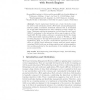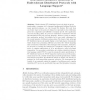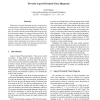205 search results - page 1 / 41 » A Role-Based Approach towards Modular Language Engineering |
104
click to vote
SLE
2009
Springer
15 years 7 months ago
2009
Springer
Modularisation can reduce the effort in designing and maintaining language specifications. Existing approaches to language modularisation are typically either focused on language ...
102
Voted
ECTEL
2007
Springer
15 years 6 months ago
2007
Springer
Search engine-based features are a basic interaction mean for users to find information inside a Web-based Learning Management Systems (LMS); nonetheless, traditional solutions la...
102
click to vote
ICFEM
2009
Springer
15 years 7 months ago
2009
Springer
Fault-tolerant (FT) distributed protocols (such as group membership, consensus, etc.) represent fundamental building blocks for many practical systems, e.g., the Google File System...
121
click to vote
ATAL
2006
Springer
15 years 4 months ago
2006
Springer
Modularization is widely recognized as a central issue in software engineering. In this paper we address the issue of modularization in cognitive agent programming languages. We d...
119
click to vote
APSEC
2005
IEEE
15 years 6 months ago
2005
IEEE
While aspect-oriented modeling has been recognized as a useful means of improving the modularity of software design, the de facto standard modeling language UML lacks first-class...



